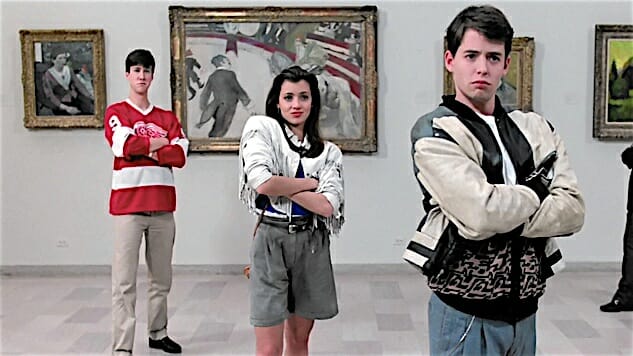“Danke schoen, darling…”: Introducing a Teen to the Teen Canon of the 1980s
Part 10: Ferris Bueller's Day Off

There was a certain need for damage control after Weird Science almost ruined Grace’s life. I mean, how could I live with myself knowing I’d trashed the ’80s for her after we’d had such a good run? John Hughes had shown his dark side, and the kid had developed reservations about Anthony Michael Hall. When that happens, what gets you back on the farm?
Anyone? Anyone?
Grace has a high tolerance for violence and adult content but what she can’t handle at all is people embarrassing themselves or getting caught in flagrante doing something stupid. So I knew Ferris Bueller’s Day Off would have her in an anxiety-pretzel the minute Matthew Broderick talked Alan Ruck into stealing his asshole dad’s car. On the other hand, Hughes was pretty much at his funniest and Broderick was at optimum Cute in that movie. And it was pleasantly driven by a story with no stakes whatsoever invested in whether the girl got noticed by the boy, which was good. I figured if she was ever going to forgive John Hughes, this was the movie to make her do it.
And no, by the way, I wasn’t invested in whether Hughes stayed in her good graces. Like I’ve said, I considered his movies juvenile nonsense when I was her age and was usually more comfortable over at the UC Theatre watching Tim Curry prance around in pouty extraterrestrial drag at the midnight show. But I was fascinated at how well some of the ’80s pop hits did hold up after 30 years, and I wanted to keep going.
Ferris Bueller’s Day Off was released in 1986. It took Hughes a week to write the screenplay, and the film’s budget was in the $5 million range. It took in over $70 million at the box office, was a popular and critical success, and has been archived by the Library of Congress as a “culturally or esthetically important” film along with the likes of Vertigo and Citizen Kane, so I guess you’d call that a success. The story was simple: Charismatic smart-aleck skips school along with buddy and girlfriend, and takes a joyride through Chicago on a quest to live life to the fullest until Mom and Dad get home or the school principal finds him and has him expelled. This was not really one of Hughes’s ponderings on class or have/have-not dynamics or even teen rebellion, though Ferris is conducting a truancy experiment. It was his comedic valentine to Chicago, plain and simple, and he found a magical fusion between his city, that script, and a Totes Adorbs young Matthew Boderick.
Broderick’s fourth-wall-breaking slacker had not lost his appeal over the years: Grace was laughing her head off from the first scene, though as I predicted, the school-escape caper made her extremely nervous.
“Dude, it’s a comedy,” I said. “You know he gets away with it. Relax.”
“I just … ack!” Broderick was posing as Mia Sara’s “Daddy” and giving her a hello kiss in the school parking lot that would have made a Targaryen blush.
“I know.”
“A parade float?”
“Let it go.”
-

-

-

-

-

-

-

-

-

-

-

-

-

-

-

-

-

-

-

-

-

-

-

-

-

-

-

-

-

-

-

-

-

-

-

-

-

-

-

-








































